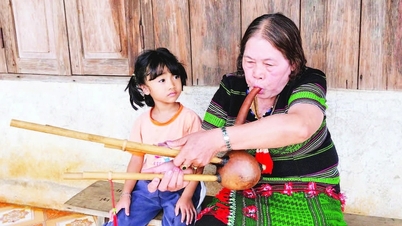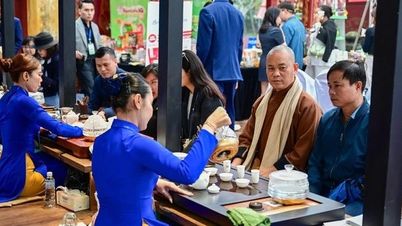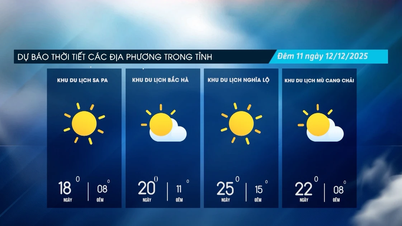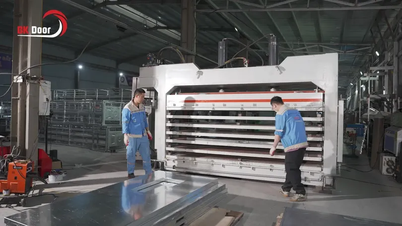Sunshine, a forgotten free gift.
Speaking to reporters about the reality of vitamin D deficiency in the community, Dr. Tran Thi Minh Hanh, Head of the Nutrition Department at Hoan My Saigon Hospital, said: "Vietnamese people live in a sunny country, but they lack vitamin D because they are afraid of the sun, rarely go outside, or cover themselves too much, fearing exposure to sunlight."

Dr. Minh Hanh's analysis indicates that vitamin D is scarce in food, with sunlight being the primary source. Under the influence of UVB rays, the skin synthesizes provitamin D, which is then converted into active vitamin D. This is the form the body can utilize.
According to Dr. Minh Hanh, recent surveys show that about 50% of Vietnamese people are deficient or have insufficient vitamin D, especially women and the elderly. Fearing skin darkening and aesthetic concerns, women often cover themselves up and apply sunscreen all over their bodies when outdoors. For the elderly, the ability to synthesize vitamin D in the skin decreases, but most choose a sedentary lifestyle and spend less time outdoors.
According to Dr. Minh Hanh, the best time to sunbathe to help the body synthesize the most vitamin D is from 10 am to 3 pm. When your shadow is equal to or shorter than your height, that's when the sun is most effective. Areas like the arms, legs, or back only need about 5 to 10 minutes of sun exposure to synthesize the necessary amount of vitamin D for the body.
Vitamin D is the key to overall health.
For a long time, vitamin D has been known primarily for its role in the musculoskeletal system. However, according to Dr. Minh Hanh, recent studies have broadened our understanding, revealing that vitamin D has a profound impact on the immune system, cardiovascular system, endocrine system, and energy metabolism.
At the cellular level, vitamin D helps regulate inflammatory responses and increases the secretion of antimicrobial peptides, thereby supporting the fight against infections, especially respiratory infections. Vitamin D deficiency significantly increases the risk and severity of acute respiratory infections.
Furthermore, vitamin D is closely linked to chronic non-communicable diseases. Vitamin D deficiency contributes to bone loss, osteoporosis, abdominal obesity, metabolic syndrome, and type 2 diabetes. "Vitamin D helps increase insulin sensitivity, reduce inflammation and oxidative stress, thereby reducing the risk of diabetes and its complications," explains Dr. Minh Hanh.

The doctor added that some evidence also suggests that low vitamin D levels may be linked to an increased risk of cancer, chronic obstructive pulmonary disease (COPD), and cardiovascular disease. In COPD patients, vitamin D supplementation helps improve lung function and reduce the frequency of acute respiratory distress syndrome episodes.
According to Dr. Minh Hanh, just 10 minutes of proper sun exposure each day is enough to maintain optimal vitamin D levels. However, many people have a habit of sunbathing early in the morning or late in the afternoon – times when UVB rays are weak and have almost no effect on vitamin D synthesis.
For young children, especially those under 12 months old, doctors recommend avoiding sun exposure during peak hours. For this group, oral vitamin D supplementation as prescribed by a doctor is necessary. Office workers and elderly people who rarely go outside should also have their blood vitamin D levels checked and receive appropriate supplementation to avoid prolonged deficiency.
"Vitamin D is a fat-soluble vitamin, so if taken in excessive amounts, it will accumulate in the body and cause harm. Therefore, supplementation needs to be individualized – depending on lifestyle, health condition, and doctor's guidance," Dr. Hanh advised.
Another noteworthy issue, according to Dr. Minh Hanh, is that Vietnamese children and students currently lack physical activity and sunlight exposure due to their packed school schedules, yet they also lack outdoor learning opportunities. “Outdoor activities not only help synthesize vitamin D but also improve mental well-being, increase concentration, and promote physical development. The brain also needs rest and rejuvenation through exercise. When health is good, learning becomes more effective,” she emphasized.
Dr. Minh Hanh notes: UVB rays do not penetrate glass or clothing, so "sitting indoors next to a sunny window" does not help produce vitamin D. After sunbathing, you can use sunscreen or cover up to protect your skin; there's no need to worry about skin darkening if the exposure is short and timely.
Source: https://baolaocai.vn/nguoi-viet-thieu-nghiem-trong-vitamin-d-vi-tranh-nang-qua-ky-post885344.html



![[Photo] Closing Ceremony of the 10th Session of the 15th National Assembly](/_next/image?url=https%3A%2F%2Fvphoto.vietnam.vn%2Fthumb%2F1200x675%2Fvietnam%2Fresource%2FIMAGE%2F2025%2F12%2F11%2F1765448959967_image-1437-jpg.webp&w=3840&q=75)



![[Photo] Prime Minister Pham Minh Chinh holds a phone call with the CEO of Russia's Rosatom Corporation.](/_next/image?url=https%3A%2F%2Fvphoto.vietnam.vn%2Fthumb%2F1200x675%2Fvietnam%2Fresource%2FIMAGE%2F2025%2F12%2F11%2F1765464552365_dsc-5295-jpg.webp&w=3840&q=75)
















![[Infographic] Preventing students from making their own firecrackers: 7 things parents need to know](https://vphoto.vietnam.vn/thumb/402x226/vietnam/resource/IMAGE/2025/12/11/1765466656703_img_0320_20251211183542.jpeg)




































![[OFFICIAL] MISA GROUP ANNOUNCES ITS PIONEERING BRAND POSITIONING IN BUILDING AGENTIC AI FOR BUSINESSES, HOUSEHOLDS, AND THE GOVERNMENT](https://vphoto.vietnam.vn/thumb/402x226/vietnam/resource/IMAGE/2025/12/11/1765444754256_agentic-ai_postfb-scaled.png)

















































Comment (0)